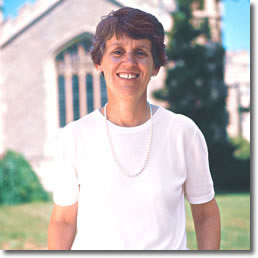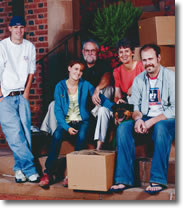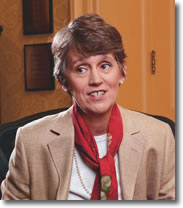A First Look: President Catharine Bond Hill
Neither Catharine Bond Hill nor her family have had time to celebrate her new job at Vassar. Her household is still settling down after a hectic summer. Son John, the oldest of three children, completed his bachelor’s at Williams, Thomas is finishing up at Kent School, and Liz left her Williamstown high school to begin sophomore year at Riverdale Country School, where dad Kent Kildahl is head of the Upper School.
The last time the family moved, they traveled 7,550 miles from Lusaka, Zambia, back to Williamstown, Massachusetts, far away from the elephant reserves to which the Kildahl children had become accustomed. After a three-year stay working with Zambia’s Ministry of Finance, Hill returned with her family to Williams College, where she was professor of economics and later provost. And Vassar’s 10th president and her family—including their dog, a stray named Nelly—made the much shorter move to Poughkeepsie this summer.
I first met Hill alongside my fellow members of the Presidential Search Committee last fall. Undaunted by the titanic table of our New York conference room, she smiled her way to a plump leather chair and introduced herself as “Cappy.” I was further privy to Cappy’s candor when I visited her family at Williamstown months later, and felt very lucky to work professionally—over a cup of green tea and laughter—with such an important new member of Vassar’s family. I hope that the Vassar community learns something new of our president through this interview, as well as helps welcome her and her family into ours.

CH The story from my parents is that it was a great-aunt who was hard of hearing. They weren’t calling me Cappy—I think they were calling me Cathy—but the great-aunt heard Cappy, and it just stuck. That’s what everybody calls me; it’s what I’ve always used.
VQ Why did you choose to pursue the Vassar presidency, and why now?
CH I think the timing was right, the school was right, and the location was right. When you step into these positions like dean of the faculty or provost, you immediately get on search firms’ lists, and they begin calling you about opportunities. I may have gotten my first call in my initial year as provost; at that point I hadn’t actually done the provost job for very long, so it just wouldn’t have made sense. But after doing the job for seven years, I’ve learned a tremendous amount about how an institution is run.
Vassar is a wonderful school. It’s starting this century in excellent condition, poised to take the things that it does exceptionally well and do them even better. I only wanted to lead at a college that I admire and one which has values that match my own, and Vassar is that place. It’s committed to diversity; it’s committed to tolerance; it has a superb faculty; it has a strong student body; and it is a beautiful place.
VQ Did you know much about Vassar before this experience?
CH Having spent my working life at Williams, I know about most of the other great liberal arts institutions, and Vassar is certainly one of them. I also knew about Vassar through several collaborations with Williams, including a technology-in-the-languages program.
I had never been to Vassar, however. My first visit to campus was in December, during the interview process. I sneaked onto campus because I wanted to know what it looked like. We got in touch with a Vassar student who had been a student of my husband’s in New York during high school, and told him that we wanted to come down and take a look at the college because my daughter was interested in seeing it. And then, of course, we showed up without my daughter because she couldn’t make it that day.

CH I went to a public high school in New York—Mamaroneck High School—which is an excellent school, but fairly large. I was a very strong student, but somewhat shy and quiet. I graduated a year early and then spent what would have been my senior year doing two different things: one half of the year was at a little experimental high school called the School Without Walls, where students essentially developed their own curricula, doing a lot of independent studies. The second half of the year I was at a very small school in Italy called the Forum School, which had about 25 students and two or three faculty members.
What both of those experiences demonstrated for me was the benefit of being in a small environment with close faculty contact. And that suggested liberal arts colleges to me.
Now, my choice of a particular one wasn’t especially educated. In fact, the college counselor at Mamaroneck had sent us to take a look at Amherst, so my mom and I drove up to Massachusetts but, in fact, Amherst hadn’t yet gone co-ed. So they recommended I take a look at Williams. We drove over there, and I liked it. Things were a little different back then. I didn’t visit 15 schools—I visited two—and decided to apply early to Williams.

CH I don’t think I actually knew what economics was when I came to college. I’ve always loved analytical things, and I have always been good at math. But I also liked public policy issues, so doing pure theoretical math, while I was good at it, wasn’t something that intrigued me. The application of analytical methods to a discipline that asked public policy questions was perfect. Somehow I made it into my first economics class in my first semester, and I knew right then that would be my major.
VQ After so many years of having such a deep-rooted history at Williams, did you have any conflicted feelings about leaving?
CH It was particularly hard as people were saying “good-bye” because they’ve been friends for 20 years. But I think a couple of things helped us make the decision. One was that for our last sabbatical we picked up and moved to southern Africa, and in the end we stayed for three years. (My husband actually stayed for four.) Africa was extremely interesting, but also it was just going some place new and different, and there’s something incredibly invigorating about meeting new people, being in a new community, being in a new place, learning about new problems, coming to problems with a fresh perspective. We found that experience so valuable, that the thought of making another change was exciting, not scary, because of all those positive things. Then again, Vassar is a great institution; I don’t think we would’ve done it for just any place.
VQ In a nutshell, what did you do in Zambia?
CH Zambia had just moved from a socialist, one-party state to a democracy, and they had transitioned from a longtime leader to a newly elected president. They had adopted an economic liberalization program to try to open up the economy, and they had requested assistance from several northern European donors. I was part of that team, working in the Ministry of Finance. I was working mostly on macroeconomic issues related to trade policy, the exchange rate, and overall government budget management.
VQ What do you find most thrilling about teaching in a classroom?
CH Teaching focuses your mind on the material. It is a way to engage the material because you’re not just reading it, you’re also thinking, “How can I talk about this with other people not only to help them understand it but also to get them excited about it?”
When you’ve been working with a discipline for a while you may not have perspective on it, and when you’re presenting it to students for whom it is fresher, they’ll often ask all kinds of amazingly good questions and have insightful comments on the material that I’m not seeing because I’m too close to it. In the classroom I can continue learning.
VQ What do you think is the value of the liberal arts education for students?
CH It seems increasingly clear to me that many of our country’s—and the world’s—problems can’t be addressed by one discipline. I think students who are exposed to the sciences, the social sciences, and the humanities are going to be well-equipped to start thinking about how to address some of these problems.
Also, our students do this in a fairly intimate, residential situation. Students and faculty get to work closely with each other, and that’s really the gold standard in terms of undergraduate education.

CH My work on higher education affordability and accessibility came out of my job as provost; the provost at Williams is responsible, among other things, for admissions and financial aid. So my academic and administrative work complemented each other. Now, there are obviously constraints on
time, and it’s been helpful having co-authors and research assistants; but I’m hoping that will continue at Vassar. The kinds of public policy issues that I engage in academically are also important for schools like Vassar, so it’ll be natural to continue with that work.
VQ What’s the toughest decision you had to make as provost at Williams?
CH The issues that can be very difficult are ones involving individuals, whether faculty, staff, or students. While there are processes and structures in place to help, these decisions end up almost by nature being confidential and involving significantly fewer people, so there’s more burden on individuals to make hard decisions. Those are nearly always idiosyncratic—there’s some outlying crisis that needs intervention—and those are difficult because each one is unique, and because it’s not something the whole campus can come around and solve.
Big policy decisions that affect the whole institution are almost always decisions that have been widely discussed. Hard decisions are made with input from lots of people and lots of buy-in. So while some of those decisions may be hard for an institution, I don’t think they’re hard individually because if things are working correctly, it’s been the entire governing structure of the institution that has addressed those issues.
VQ How have you balanced being a wife, mother, professor, and college administrator?
CH i’m pretty organized. I’m focused, so I can both multitask and go from one thing to another pretty quickly. You have to set priorities; you have to let some stuff go; you have to contract a lot of stuff out. You delegate, and you figure out what the important things are, and you really focus on those. So I try to do the important things with my family; I make sure I do the important things at work.
In these jobs and these lives on campuses, personal and work life are very integrated and intermingled. It’s a little hard to say what’s work and what’s not work. When I go to a production put on by the theater department and I bring my kids, I’m multitasking: I’m doing something with my family, I’m doing something that I like to do, and I’m seeing students and faculty do their jobs.
VQ What books do you read, if you have any time at all?
CH I like to read mysteries by a variety of writers. I’m reading an author right now who writes about a woman detective in Botswana, which is fun because I’ve done research work on Botswana. So when she talks about Gaborone, the capital city, I am familiar with it. I try to read The Economist every week; I don’t get it done, but I get much of it read. It’s a great source of international economic and political news.

CH New challenges. A new place to make relationships: so, new friends, new colleagues. I think that will be very invigorating.
Walter Padilla ’07 is an international student from Baja California, Mexico, and a graduate of University City High School in San Diego, California. Padilla was one of two student representatives on the Presidential Search Committee. A film major with a Hispanic studies correlate, Padilla will work with President Hill this year as her student assistant.
President Hill Visits in 2006–07
During her inaugural year as president of Vassar, Catharine Bond Hill is scheduled to visit the following cities to meet alumnae/i of the college.
Chicago, IL
Cleveland, OH
London, England
Los Angeles, CA
New York, NY
Palm Beach, FL
Philadelphia, PA
Poughkeepsie, NY
San Francisco, CA
Washington, D.C.
Additional cities will be added to her schedule in Fall 2007. For further information contact programs@vassar.edu or 888.328.8528. Or visit www.vassar.edu/president/conversations/.
A Little Background
Catharine Bond Hill is a noted economist whose work focuses on higher education affordability and access, as well as on economic development and reform in Africa. For the previous seven years Hill was the provost of Williams College, with major financial and academic responsibilities, including her role as the college’s chief financial officer.
At Williams, Hill oversaw the annual college budget and long-range financial planning, the Williams College Museum of Art, the Williams College Libraries and the offices of Admissions, Financial Aid, and Information Technology. She was also a member of the Committee on Appointments and Promotions, which makes all reappointment and tenure decisions and allocates faculty positions.
Hill most recently co-authored with Gordon C. Winston, the Orrin Sage Professor of Economics at Williams, the studies “Access to the Most Selective Private Colleges by High-Ability, Low-Income Students: Are They Out There?” (forthcoming in College Access: Opportunity or Privilege?, College Board, Fall 2006) and “Affordability: Family Incomes and Net Prices at Highly Selective Private Colleges and Universities” (Journal of Human Resources, Fall 2005). The current work of Hill and her colleagues on the economics and affordability of higher education is primarily supported by a grant from the Andrew W. Mellon Foundation.
Hill originally joined the economics faculty at Williams in 1985, and eventually chaired the college’s economics department, Center for Development Economics, and Committee on Priorities and Resources. In her earlier career she worked for the World Bank and the Fiscal Analysis Division of the U.S. Congressional Budget Office.
Hill graduated summa cum laude from Williams College, and also earned B.A. and M.A. degrees at Brasenose College, Oxford University, with first class honours in politics, philosophy, and economics. She completed her Ph.D. in economics at Yale University.
